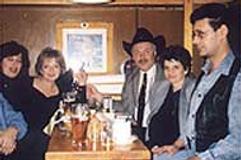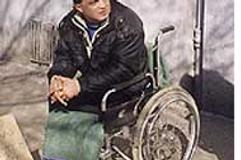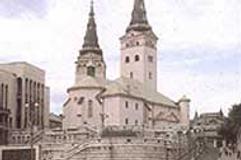Archive of articles - February 2000
If you desire to read an old article, use the search bar or select the publication date.
Serious journalism that remained fun
In January 1995 I met a bunch of free-wheeling Americans who spoke barely a word of Slovak beyond phrases such as 'Nick's Apache' (an attempt at the Slovak version of "here you go") or 'nice driveway' (Slovak for 'cheers'). When they told me they were determined to launch an English-language newspaper on March 1, my first reaction was "ha-ha."
Linkages crucial to firm performance
It was really me who was getting the lecture this time, and from a rather unlikely source. A professor of anthropology turned entrepreneur was explaining the need for the ever-expanding field of cultural anthropologists in this high tech world. As I had begun my university studies in cultural anthropology, I thought I knew enough to carry my end of the conversation. But I learned a few things about performance on the way.What I learned about was linkages - how all of the elements in a given system must connect. Parts that do not connect to the whole, and are left to go their merry way, often bring entire systems to a grinding halt.
Railway strike looms as union rejects offer
After failing to reach an agreement with management over a wage increase, employees at Slovak Railways (ŽSR) are planning a mid-March nationwide strike that would stop all train transport in the country. The ŽSR union is demanding a 10% increase in salaries to match Slovakia's 1999 inflation rate of 11%, while ŽSR management has offered a mere 2.4% raise, citing a lack of funds.If the strike were called - a possibility that ŽSR management considers quite likely - both passenger and freight transport would come to a halt for the first time in Slovak history, and the rail company would lose 60 million Slovak crowns ($1.4 million) a day. Union officials have not said how long the strike might last.
Community Calendar
First Annual Internship FairHash Run
A slice of country in Petržalka
In April 1994, Eva Zaujecová had a decision to make. Wanting to establish a pub, she had the necessary start-up capital and a bit of space on the basement floor of a Petržalka paneláky building - but what she didn't have was a theme."Country music and folk is my favourite music," she said at her Country Club Dvorana pub. "During socialism the radio stations did not play the music so much, so I thought there would be a demand for this type of theme."Although country tunes evoke images of the wild west, it is here amidst the mammoth concrete blocks of flats in Petržalka that you are likely to hear Willie Nelson singing Don't Fence Me In.
Fitness Clubs
Fitness ClubPengymFitness Centrum LafranconiArena GymHotel Danube Fitness Centre
Beggars fight bum reputation
Rasťo Holúbek is a part of a new phenomenon in Slovakia - he's a beggar. Four years ago, he was beaten up an robbed by a gang of drunk men, and then flung in front of a passing train. He lost both legs in the accident, and his wife and daughter a few months later when they walked out on him. These days he can be found in a wheel chair on one of Bratislava's busy streets, begging money from passersby to pay for a pair of prostheses.There aren't many beggars in Slovakia by Western standards - police estimate that around 50 panhandlers work the streets of the capital during the summer months, while regional cities like Košice and Banská Bystrica are home to about 15 mendicants each.
Tiso plaque awakens dark past
A decision by the Žilina city council to officially honour the memory of Jozef Tiso, the leader of Slovakia's World War II nazi-puppet state, has rekindled a passionate debate about the country's murky past. Nationalists applauded the plaque, calling Tiso a 'Slovak hero', but Jewish groups and mainstream Slovak society termed the move as a disgrace.Fully 40 out of 41 city council members in the northern Slovak town of Žilina (pop. 85,000) voted on February 17 to dedicate a plaque to Tiso, a Catholic priest and president of the 1939-45 fascist Slovak Republic. Tiso, who supervised the deportation of between 60,000 and 70,000 Jews to wartime concentration camps, was after the war discovered hiding in Austria by American intelligence and was executed as a war criminal in 1946.
- Weekend: On your marks, get set... Running and marathon season beckons
- News digest: Thousands march as Fico stands by “Russian-style” NGO bill Photo
- Strange romance: Slovak leaders’ affection for Russia has yo-yoed
- Foot-and-mouth outbreak hits major Slovak cattle farm near Austrian and Czech borders Photo
- 'Don’t be afraid to use cash, say Slovak entrepreneurs as transaction tax begins
- What abides: Giving a shit
- Syrian about to finally finish hotel in Bratislava started 17 years ago
- News digest: 350 brown bears to be culled as Slovakia declares emergency
- What abides: Giving a shit
- Weekend: On your marks, get set... Running and marathon season beckons
- Číž spa water once even sent to USA
- News digest: Thousands march as Fico stands by “Russian-style” NGO bill Photo
- Strange romance: Slovak leaders’ affection for Russia has yo-yoed
- A diplomat who thrives on building bridges…and making things happen
- Foot-and-mouth outbreak hits major Slovak cattle farm near Austrian and Czech borders Photo
- 3 free things to do in Bratislava in the next seven days
- Foot-and-mouth outbreak hits major Slovak cattle farm near Austrian and Czech borders Photo
- What abides: Giving a shit
- Weekend: On your marks, get set... Running and marathon season beckons
- A paper that wasn’t supposed to last
- News digest: 350 brown bears to be culled as Slovakia declares emergency
- From Mexico to Slovakia – finding a new life Audio
- We are partners, friends and Allies
- Bratislava satellite town breaks records and keeps expanding
- Foot-and-mouth outbreak hits major Slovak cattle farm near Austrian and Czech borders Photo
- Slovak dad drops everything for son’s NHL debut — even a flight
- The Slovak-American who wants the world to witness the quality of Slovak wines
- France and Slovakia: Believing, loving, and working together
- Last Week: As disease spreads, Fico no longer insists on a “different opinion”
- Trading McDonald’s for the front lines
- What abides: Giving a shit
- From Mexico to Slovakia – finding a new life Audio
- 'Don’t be afraid to use cash, say Slovak entrepreneurs as transaction tax begins
- Štítnik resumes hand-crafting Christmas ornaments after 25 years
- Weekend: On your marks, get set... Running and marathon season beckons
- Top 10 events in Bratislava for foreigners
- From furniture to finance: businesses that shaped Slovakia’s market economy
- A partnership centuries in the making
- News digest: Thousands march as Fico stands by “Russian-style” NGO bill Photo
- Slovakia clings to its gas transit dream, even as pipelines burn More articles ›





